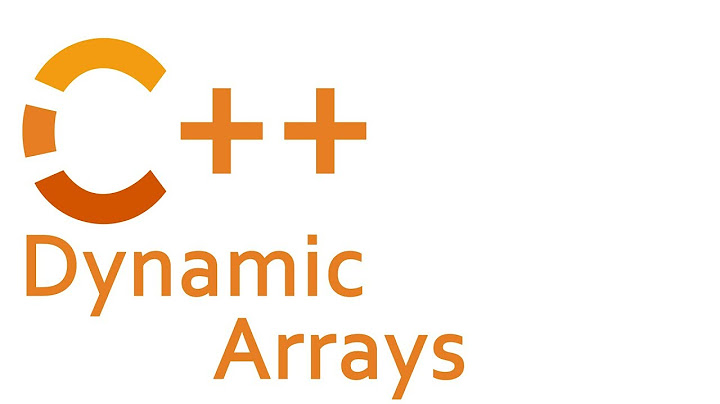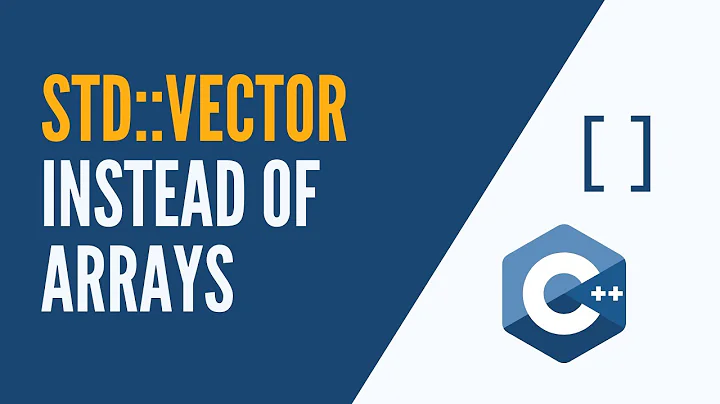How to initialize std::vector from C-style array?
Solution 1
Don't forget that you can treat pointers as iterators:
w_.assign(w, w + len);
Solution 2
You use the word initialize so it's unclear if this is one-time assignment or can happen multiple times.
If you just need a one time initialization, you can put it in the constructor and use the two iterator vector constructor:
Foo::Foo(double* w, int len) : w_(w, w + len) { }
Otherwise use assign as previously suggested:
void set_data(double* w, int len)
{
w_.assign(w, w + len);
}
Solution 3
Well, Pavel was close, but there's even a more simple and elegant solution to initialize a sequential container from a c style array.
In your case:
w_ (array, std::end(array))
- array will get us a pointer to the beginning of the array (didn't catch it's name),
- std::end(array) will get us an iterator to the end of the array.
Solution 4
You can 'learn' the size of the array automatically:
template<typename T, size_t N>
void set_data(const T (&w)[N]){
w_.assign(w, w+N);
}
Hopefully, you can change the interface to set_data as above. It still accepts a C-style array as its first argument. It just happens to take it by reference.
How it works
[ Update: See here for a more comprehensive discussion on learning the size ]
Here is a more general solution:
template<typename T, size_t N>
void copy_from_array(vector<T> &target_vector, const T (&source_array)[N]) {
target_vector.assign(source_array, source_array+N);
}
This works because the array is being passed as a reference-to-an-array. In C/C++, you cannot pass an array as a function, instead it will decay to a pointer and you lose the size. But in C++, you can pass a reference to the array.
Passing an array by reference requires the types to match up exactly. The size of an array is part of its type. This means we can use the template parameter N to learn the size for us.
It might be even simpler to have this function which returns a vector. With appropriate compiler optimizations in effect, this should be faster than it looks.
template<typename T, size_t N>
vector<T> convert_array_to_vector(const T (&source_array)[N]) {
return vector<T>(source_array, source_array+N);
}
Solution 5
The quick generic answer:
std::vector<double> vec(carray,carray+carray_size);
or question specific:
std::vector<double> w_(w,w+len);
based on above: Don't forget that you can treat pointers as iterators
Related videos on Youtube
Frank
Updated on November 26, 2020Comments
-
Frank over 3 years
What is the cheapest way to initialize a
std::vectorfrom a C-style array?Example: In the following class, I have a
vector, but due to outside restrictions, the data will be passed in as C-style array:class Foo { std::vector<double> w_; public: void set_data(double* w, int len){ // how to cheaply initialize the std::vector? }Obviously, I can call
w_.resize()and then loop over the elements, or callstd::copy(). Are there any better methods?-
Void over 14 yearsThe crux of the problem is that there is no way for the vector to know if the same allocator was used to create your C-style array. As such the vector must allocate memory using its own allocator. Otherwise it could simply swap out the underlying array and replace it with your array.
-
-
Frank over 14 yearsIn my case, the assignment will happen repeatedly.
-
Frank over 14 yearsIs there a performance difference between
std::copy(w, w + len, w_.begin())and yourassignsolution? -
Frank over 14 yearsOh, I guess the difference is that
std::copywill not resize the array. -
Matteo Italia over 14 yearsI don't know if assign is smart enough to compute how much w is distant from w+len (a generic iterator AFAIK does not provide a quick way to do this), so you may enhance a little the performances putting a w_.reserve(len) before that statement; in the worst case you gain nothing. In this way it should have more or less the performance of resize+copy.
-
 Pavel Minaev over 14 yearsIt's a quality of implementation issue. Since iterators have tags that specify their categories, an implementation of
Pavel Minaev over 14 yearsIt's a quality of implementation issue. Since iterators have tags that specify their categories, an implementation ofassignis certainly free to use them to optimize; at least in VC++, it does indeed do just that. -
jamk about 11 yearsThe quick solution could be std::vector<double> w_(w,w+len);
-
Harini Sampath about 10 yearsThis copies elements to a newly created storage for 'w_'; 'w_.data' will not point to 'w'. You still have to deallocate 'w'. There's no ownership transfer
-
 Pavel Minaev about 10 yearsSure, but this is as good as you can get with a vector. It does not provide any facility to attach to an existing buffer.
Pavel Minaev about 10 yearsSure, but this is as good as you can get with a vector. It does not provide any facility to attach to an existing buffer. -
Wayne Uroda about 9 yearsIs this safe to do when when
w+lenpoints to the element past the end of the array, as in, when you want to use this method to take the last 10 elements of a 100 element array? In VS2013 I got a debug assertion that the source array had been accessed out of bounds, which made me cautious, and I ended up using a more C-style approach. -
 Pavel Minaev about 9 yearsIf it's one element past the end, it should be okay (just as
Pavel Minaev about 9 yearsIf it's one element past the end, it should be okay (just asv.end()is an iterator pointing one past the end with vector in a similar case). If you do get an assertion, then something is off elsewhere. -
Vlad over 8 yearsWhat includes/version of C++ does this require?
-
Vlad over 8 yearswhat if data to be shared between the vector and an array? Do we need to copy anything in this case?
-
Mugurel over 8 yearsThis is one of the constructors of std::vector from at least c++98 onwards.... It's called 'range constructor'. cplusplus.com/reference/vector/vector/vector Try it.
-
Andrew Romanov over 8 yearsMore independent version is: w_ (std::begin(array), std::end(array)); (In the future you can to change a C array for a C++ container).
-
 ShadowRanger about 8 yearsMind you, this only works if you have a real
ShadowRanger about 8 yearsMind you, this only works if you have a realarray(which usually means you're copying from a global or local (declared in current function) array). In the OP's case, he's receiving a pointer and a length, and because it's not templated on the length, they can't change to receiving a pointer to a sized array or anything, sostd::endwon't work. -
Vineel almost 8 yearsAlso if you want to statically allocate in C++11 use initializer_list like below vector<double> w_{1.2, 2.3, 4.3};
-
M.M over 7 years
vectordoes not overloadoperator(), so this won't compile.std::endbeing called on a pointer is no use either (the question asks to assign a vector from a pointer and a separate length variable). It would improve your answer to show more context about what you are trying to suggest -
M.M over 7 yearsIn the last sample,
return { begin(source_array), end(source_array) };is also possible -
 Jean-François Fabre almost 6 yearsis that an answer or a question? what does it bring to the already existing answers?
Jean-François Fabre almost 6 yearsis that an answer or a question? what does it bring to the already existing answers? -
 Janusz Lenar almost 6 years@Jean-FrançoisFabre and what does your comment bring? ;) true, it's a poor answer given ages ago.
Janusz Lenar almost 6 years@Jean-FrançoisFabre and what does your comment bring? ;) true, it's a poor answer given ages ago. -
 Adrian Albert Koch over 4 yearsJust quickly, will this deallocate the array memory when the vector goes out of scope?
Adrian Albert Koch over 4 yearsJust quickly, will this deallocate the array memory when the vector goes out of scope?











![#13 [C++]. Hướng Dẫn Sử Dụng Thành Thạo Vector Trong C++ | Lớp Vector Và Iterator](https://i.ytimg.com/vi/053Tcz4omzk/hq720.jpg?sqp=-oaymwEcCNAFEJQDSFXyq4qpAw4IARUAAIhCGAFwAcABBg==&rs=AOn4CLDRs4FTLNZB7zqHbGApi2yTigdAGg)
